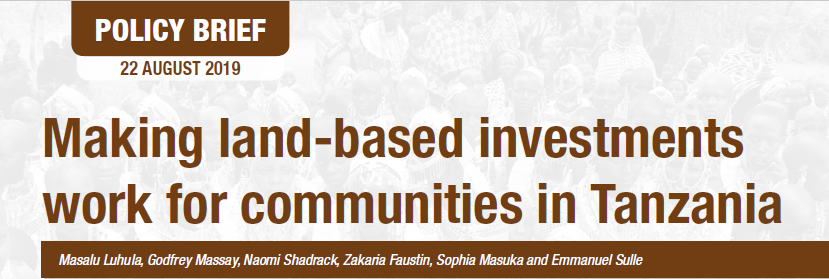SRMP Training on Pastoralism and Rangelands production systems for CSOs, LGAs and Local Leaders.
From March 25th - 29th 2013, TNRF will hold training in Dodoma on Pastoralism and rangeland production systems for CSOs, LGAs and local leaders that are implementing the Sustainable Rangeland Management Project (SRMP). This project is being implemented by five key partners, including CARE Tanzania, International Fund for Agricultural Development (IFAD), International land Coalition (ILC), TNRF, and the Ministry of Livestock Development Fisheries. SRMP was designed as a pilot project to facilitate the development of and demonstrate improved approaches for Village Land Use Planning and management in rangelands in Tanzania. In addition, the project aims to secure land and resource rights of pastoralists, agro-pastoralists and crop farmers and improve land management by supporting village and district land use planning and rangeland management in Kiteto, Bahi, Chamwino and Kondoa Districts in Tanzania. More broadly it aims to influence policy formulation and implementation on these issues.
This training will engage 32 participants; Ministry of Livestock and Fisheries (MoLFD), Regional Livestock Advisors (RLAs) from Dodoma & Manyara Regions, District Officials (4SRMP Coordinators), CARE-Tanzania, District Chairpersons and Ward Councilors from implementing Districts, implementing CSOs (DONET, MMC, KINNAPA, BAENET) and 2 Village Chairpersons from Lahoda and Ngabollo.
Specific aims of the training
To enable, equip and familiarize participants with:
- The concept of pastoralism for better management of resources and livelihood.
- Knowledge and skills on pastoral systems, policy analysis and advocacy.
- Approaches and steps to follow when doing policy analysis and advocacy at the local level.
- Organizational training practices, integration and accommodation of pastoral systems into natural resources management initiatives in their respective localities for betterment of pastoral livelihoods.
Expected Outputs
- Implementing parties to have a common understanding about the concept of pastoralism, policy analysis and advocacy.
- The conceptualized and internalized roles and contributions of different stakeholders in pastoral systems, policy analysis and advocacy.
- Participants are aware of constraints and challenges in the pastoral livelihoods in Tanzania
- Appropriate participatory advocacy approaches and steps, policy processes and steps are known to participants and can be used easily to train beneficiaries and also during the advocacy of pastoral needs.

